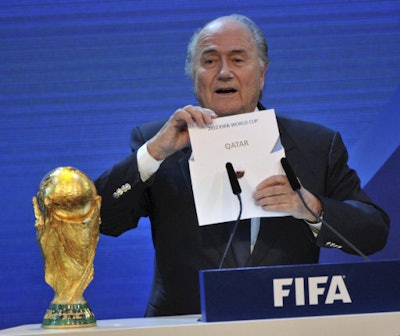There is nothing that warms the heart quicker than a couple hundred Western sports journalists denouncing something it's clear they know nothing about. Prior to FIFA's Dec. 2 selection of Qatar to host the 2022 World Cup, did any of these writers and talking heads give any thought either to soccer or to the tiny Middle Eastern nation that has promised to build nine air-conditioned outdoor stadiums in order to properly host the event during a desert summer?
 PA-9870235.jpg
PA-9870235.jpg
Probably not. However, stung by the rejection of the United States' bid (not to mention the rejection, that same day, of England's bid to host the 2018 Cup in favor of Russia), sports journalists are proving they won't be giving either subject any rational thought at least until the day that the U.S. once again lands the world's biggest sporting event.
In this alternate universe, Qatar 2022 is not just a shock, it's insane. It "does not make sense, that's obvious," as Brian Westfall wrote in The Toronto Sun. But actually, Qatar makes perfect sense as a host country, and isn't even all that shocking - unless you were completely unaware that South Africa just got finished hosting the 2010 World Cup. FIFA's stated goal these days is to bring the World Cup into new markets, and to avoid traditional ones; as FIFA president Sepp Blatter said after the votes for Russia and Qatar, "We go to new lands."
The journalistic votes against Qatar are built on two arguments, one based on size and the other on money. Neither makes any sense (that's obvious):
1. Qatar is the size of Connecticut, and its population is smaller than Houston's.
So what? The World Cup is watched by billions of people all over the globe. It doesn't matter how many people live within a 100-mile radius of the stadium. On the other hand, the region matters a great deal. Football in Qatar, a country that is 77 percent Muslim, will boost interest not just in this small nation, but the entire Middle East and the Muslim world.
2. By saying no to the United States, which put 3.6 million people in the seats in 1994 (the best-attended World Cup of all time), FIFA stupidly said no to the bid promising the most revenue.
It's true: The U.S. held the 1994 matches in cavernous football stadiums, and sold out virtually all its inventory. It's also true that ticket sales in South Africa were extremely disappointing to the host country, and yet the 2010 Cup still generated $3.4 billion in revenue for FIFA.
Truer still is that, for all the interest in soccer in the U.S. that has been generated by the 1994 Cup, the 1999 Women's World Cup (held in and won by the U.S.), Major League Soccer and the very recent access to worldwide matches on the Internet and premium cable channels, the sport still attracts few spectators in the glutted American market. On the other hand, soccer is by far the most popular sport in the Arab world.
FIFA, having successfully brought the Cup to Africa for the first time, next goes to Brazil, football's most enduring international power and a coming global economic force. After that, by bringing the Cup for the first time to Eastern Europe and the Middle East, FIFA will potentially open up and reap long-term benefits from two huge new commercial audiences.
Does that sound insane to you?




































